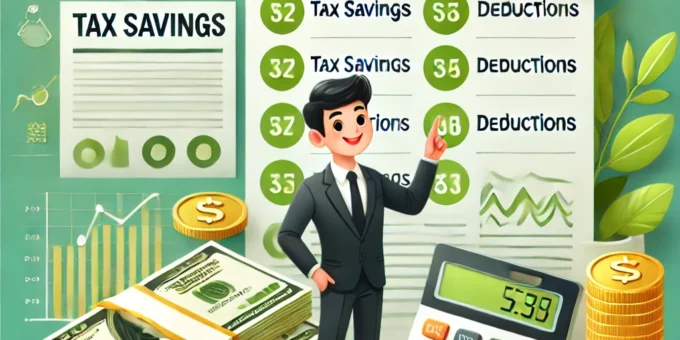
Understanding how to claim tax deductions and credits can make a substantial difference to your finances. Both deductions and credits reduce your tax burden but in different ways. Here’s how you can maximize your savings, uncover opportunities, and ensure no eligible benefit goes unnoticed.
What Are Tax Deductions and Credits?
Tax deductions reduce your taxable income, lowering the amount of income subject to tax. In contrast, tax credits reduce the actual amount of tax owed, often providing a dollar-for-dollar reduction. Together, these mechanisms are essential tools in tax planning.
- Deductions: Examples include student loan interest, medical expenses, and charitable donations.
- Credits: Think Earned Income Tax Credit (EITC), Child Tax Credit, and educational credits like the Lifetime Learning Credit.
The Importance of Claiming Tax Deductions and Credits
Failing to claim deductions or credits means leaving money on the table. These financial tools are designed to incentivize specific actions, like saving for retirement or adopting eco-friendly practices. They can significantly reduce your tax bill or increase your refund.
How to Identify Missed Tax Deductions and Credits
Missing out often happens due to a lack of awareness or insufficient record-keeping. To identify potential deductions and credits:
- Review last year’s return for overlooked items.
- Consult IRS publications or a tax professional.
- Use tax preparation software with deduction and credit finders.
Commonly Overlooked Tax Deductions
- State Sales Tax: Especially beneficial for residents of states without income tax.
- Job Search Expenses: Costs for job hunting in your current profession might be deductible.
- Out-of-Pocket Educator Expenses: Teachers can claim up to $300 for classroom supplies.
- Charitable Contributions: Include cash donations, as well as the value of donated goods.
Maximizing Tax Credits
Unlike deductions, credits directly lower your tax liability. Here are some you shouldn’t miss:
- Earned Income Tax Credit (EITC): For low- to moderate-income workers.
- Child and Dependent Care Credit: Helps offset childcare or eldercare costs.
- Energy Efficiency Credits: Available for home improvements like solar panels.
How to Claim Tax Deductions
- Standard vs. Itemized Deduction: Decide based on which provides a greater tax benefit.
- Maintain Records: Keep receipts, statements, and documentation.
- File Accurately: Use Form 1040 and relevant schedules.
Understanding Itemized Deductions
Itemizing allows taxpayers to deduct specific expenses. Common itemized deductions include:
- Medical expenses exceeding 7.5% of adjusted gross income.
- Mortgage interest.
- Property and state income taxes.
Leveraging Tax Credits Effectively
- Education Credits: The American Opportunity Tax Credit offers up to $2,500 annually per student.
- Adoption Credit: Covers qualifying adoption expenses, up to $14,890.
- Retirement Savings Contributions Credit: Encourages retirement contributions by offering a credit of up to $1,000.
Steps to Claim Tax Credits
- Determine Eligibility: Consult IRS guidelines for each credit.
- Complete Necessary Forms: Such as Form 8863 for education credits.
- Double-Check Your Return: Ensure accuracy to avoid delays.
Common Mistakes When Claiming Deductions and Credits
- Overlooking Small Deductions: Even small deductions, like union dues, add up.
- Incorrect Filing Status: Can affect eligibility for specific benefits.
- Failing to Amend Returns: If you find an error, file Form 1040-X.
Key Tips for Maximizing Deductions and Credits
- Use Tax Software: These programs help identify overlooked benefits.
- Hire a Professional: Particularly helpful for complex returns.
- Keep Updated: Tax laws change yearly; stay informed.
Claim Tax Deductions and Credits: A Strategic Approach
Understanding the interplay between deductions and credits is critical. Strategically plan your finances throughout the year to maximize eligible benefits.
FAQs
How can I determine if I qualify for a tax credit?
Eligibility depends on the specific credit. Check IRS publications or consult a tax professional.
Can I claim both a deduction and a credit for the same expense?
No, expenses can typically only be claimed once, either as a deduction or credit.
What if I miss a deduction or credit when filing?
File an amended return using Form 1040-X to correct the oversight.
Are there deductions available for home office expenses?
Yes, if you use part of your home exclusively for business purposes, you may qualify.
How does the standard deduction compare to itemizing?
The standard deduction is a fixed amount, while itemizing allows for deducting specific expenses.
What records should I keep for tax deductions?
Receipts, bank statements, medical bills, and donation letters are essential.
You Can Also Read : How to Reduce Your Tax Liability Legally and Efficiently
Conclusion
Claiming tax deductions and credits is more than a year-end task; it’s a year-round strategy. By understanding your options and staying organized, you can optimize your financial outcomes. Remember, every deduction and credit counts—start planning today to take full advantage of these powerful tax-saving tools.
